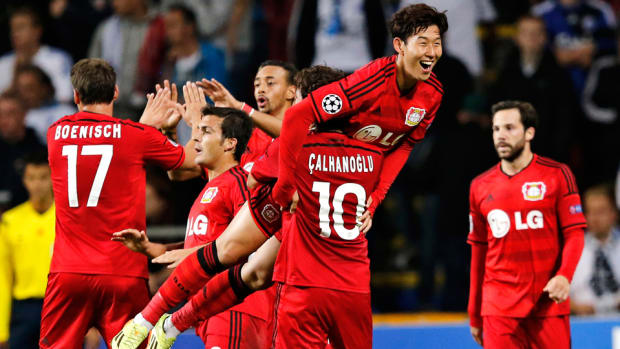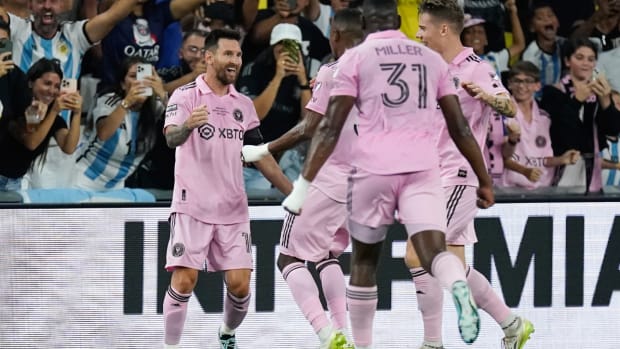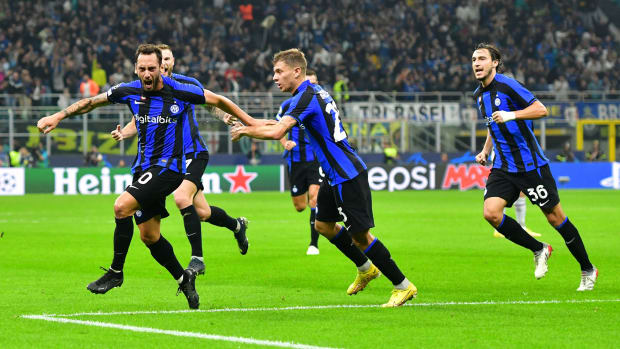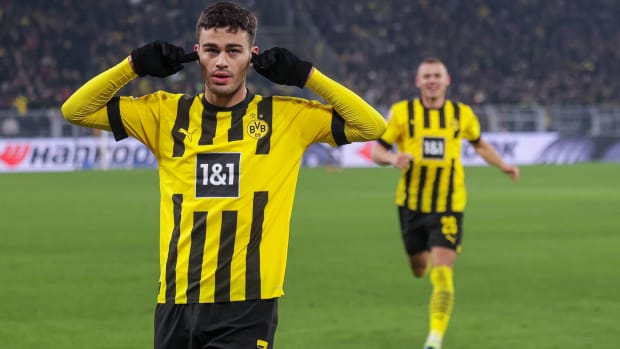
With Pulisic Limited, Other Stars Out, U.S. Looks to Keep Hold of Momentum vs. Mexico
CINCINNATI — Because of the stakes, because of the rivalry and because of what’s sure to be a uniquely partisan home-field advantage, Friday’s World Cup qualifier between the U.S. men’s national team and Mexico here is one that fans will have “put down on their calendar,” U.S. coach Gregg Berhalter said.
“They can’t wait for it,” he claimed.
The schedule was unveiled last December and U.S. Soccer chose FC Cincinnati’s 26,000-seat TQL Stadium back in July. There’s been ample time for hype and anticipation. But that’s mostly for fans and media. It doesn’t help the coaches. Despite the lengthy runway, forming a team is almost always a last-minute production, and imagining an ideal starting 11 is folly.
On Friday against El Tri, Berhalter will manage what’s probably the biggest game of this three-year tenure without his three most individually skillful and creative players. Borussia Dortmund forward Gio Reyna (hamstring) and Barcelona defender Sergiño Dest (back) aren’t in camp, and on Thursday, Berhalter revealed that Christian Pulisic still isn’t fit enough to start. The Chelsea winger, who’s been battling a left ankle injury since a September qualifier in Honduras, is in camp but will hope to make an impact against Mexico off the bench.
Pulisic, a 23-year-old Champions League winner who’s often positioned as the face of the national team’s recent youth movement, remains a uniquely menacing attacking threat. But he’s appeared for the U.S. just six times in the past two years, playing only 152 minutes of the 540 so far in World Cup qualifying. The U.S. (3-1-2) is in second place in Concacaf’s eight-team final round, which will send the top three finishers to next year’s World Cup in Qatar and a fourth side to an intercontinental playoff. El Tri (4-0-2) leads the pack.
“He looks good. For us it was about assessing him, giving him a couple good days of training and building him up to this point where we could make him available,” Berhalter said of Pulisic on Thursday afternoon. “That was the whole idea. He’s a guy that I think you want him to be able to help your team no matter where he is. And for us it was assessing him, again, working with our medical staff and getting him ready to play. He will be ready to play. He won’t start the game, and hopefully we can get him in this game.”
Pulisic’s fitness has been a concern with frustrating frequency during his young career, and it’s been an especially sensitive topic in recent weeks. After missing time following a positive COVID-19 test in late August, Pulisic then suffered several setbacks as he tried to return from the injury incurred while on duty with the U.S. Chelsea coach Thomas Tuchel revealed some of his frustration after Pulisic finally returned to Premier League action last Saturday—a five-minute stint against Burnley (he also played the final 16 minutes of a Champions League match at Malmö last week).
“We are a bit worried,” Tuchel told reporters. “Hopefully everybody and he, himself, is responsible and does not get carried away by emotions and by helping, of course, his country to win a super-important match. So hopefully all goes well and hopefully the minutes will elevate him, that he comes back stronger.”
Berhalter bristled a bit when asked Thursday about Tuchel’s comments.
“It was kind of strange to hear that come out from Tuchel, because we use common sense. Christian was back training for three days before these games—before the game that he played the first time in Malmo,” Berhalter said. “Then I think he got another maybe day of training before the next game against Burnley. So he’s been training for four days, and common sense is going to tell us you can’t start a guy in a game like [Friday’s] when he’s only been training for four days and he’s been out for two months.
“I understand Tuchel’s concern,” Berhalter continued. “Our idea wasn’t to play [Pulisic] 180 minutes in this trip anyway. He’s not going to start tomorrow. Hopefully he’ll get some playing time. We’ll put him on the field and he can make an impact and help us get the result that we want.”
The U.S. plays at Jamaica (1-3-2) next Tuesday and that point will already be more than halfway done with qualifying.
Pulisic’s absence at the opening whistle means that Berhalter’s front three probably will feature Brenden Aaronson at left wing, Tim Weah on the right and Ricardo Pepi in the striker’s role. In midfield, the U.S. likely will feature Tyler Adams behind Weston McKennie and Yunus Musah, a robust threesome that played well together in prior qualifiers against Jamaica and Costa Rica. What they lack in international experience relative to the likes of El Tri linchpins like Héctor Herrera, Edson Álvarez and Andrés Guardado, they should make up for with their ability to cover ground, break lines and play dynamic soccer on both sides of the ball.
“I think that the most important thing for us when we play together is that we feel like we have really good chemistry together—a really good balance [and] different qualities,” Adams said Thursday of the young American trio. “What we’ve learned form the couple of past games [against Mexico] that we’ve played against them is it’s a transitional game. You have to be ready on both ends of the ball to react quickly.”
Berhalter’s defense will be anchored by goalkeeper Zack Steffen, who the manager announced Thursday as the starter. Steffen has played in only one fo the six World Cup qualifiers so far, last month’s 2-1 win over Costa Rica. He then started two matches for Manchester City in October. Absent Dest, the veteran DeAndre Yedlin likely will start at right back, while Antonee Robinson should be the choice on the left. Walker Zimmerman and Miles Robinson, who scored the only goal in the Concacaf Gold Cup triumph over Mexico three months ago, are potential options at center back.
That 1–0 Gold Cup win in Las Vegas was part of a potentially transformative summer for the U.S. Mexico had held sway in the rivalry for several years, and that included a 2–1 win in a November 2016 qualifier in Columbus that marked the beginning of the end for then-coach Jurgen Klinsmann. For the U.S., it was a harbinger of the massive World Cup disappointment to come. After falling in the 2019 Gold Cup final and then a subsequent friendly under Berhalter, the U.S. was on 1-4-1 skid against El Tri heading into this summer. But the young Americans then turned the tables, defeating Mexico, 3–2, in June’s Concacaf Nations League final in Denver (Pulisic converted the clinching penalty kick in overtime), and then the continental championship decider in August.
Friday’s result may depend on how each team handles that shift. Mexico will focus on set-piece defense—that’s how the U.S. won this summer—while hoping that the return of Wolverhampton Wanderers striker Raúl Jiménez will tip the scales. The 30-year-old missed both finals. The Americans will have to manage Mexico’s press without some of their more technically gifted players. They’ll also have to make sure that all that recent tournament success isn’t on their minds come kickoff. The pendulum can swing back quickly.
“The experience that we gained from playing in those tournaments over the summer gave a lot of different players the opportunity to play in big games. The big takeaways obviously from that were raising two trophies at the end,” Adams said. “But at the end of the day, those trophies don’t mean anything to us now moving forward into this game, because we have a World Cup on the line.”
Only four players on this month’s squad and only one likely starter, Yedlin, have prior qualifying experience against Mexico. But Berhalter’s team has been through a lot. It’s evolved and grown over a couple years. It’s won without key contributors. It’s rebounded from defeat, and it’s experienced some success. It’ll all have to coalesce in Cincinnati. Ready or not, that date on the calendar has arrived.
“We’re not going to be able to make up for Mexico’s experience. That one’s done. They’ll have an average age of something like 29 years old. We’ll be somewhere closer to 22, 23 years old. That’s just how it’s going to be,” Berhalter said. “What we’ve tried to do is give these guys the experience over the last couple of years. We played Mexico four times in the last two years, and we’ve learned from those games. And it’s important that we’re taking all those lessons on board as we prepare for tomorrow night.”
More Soccer Coverage:







